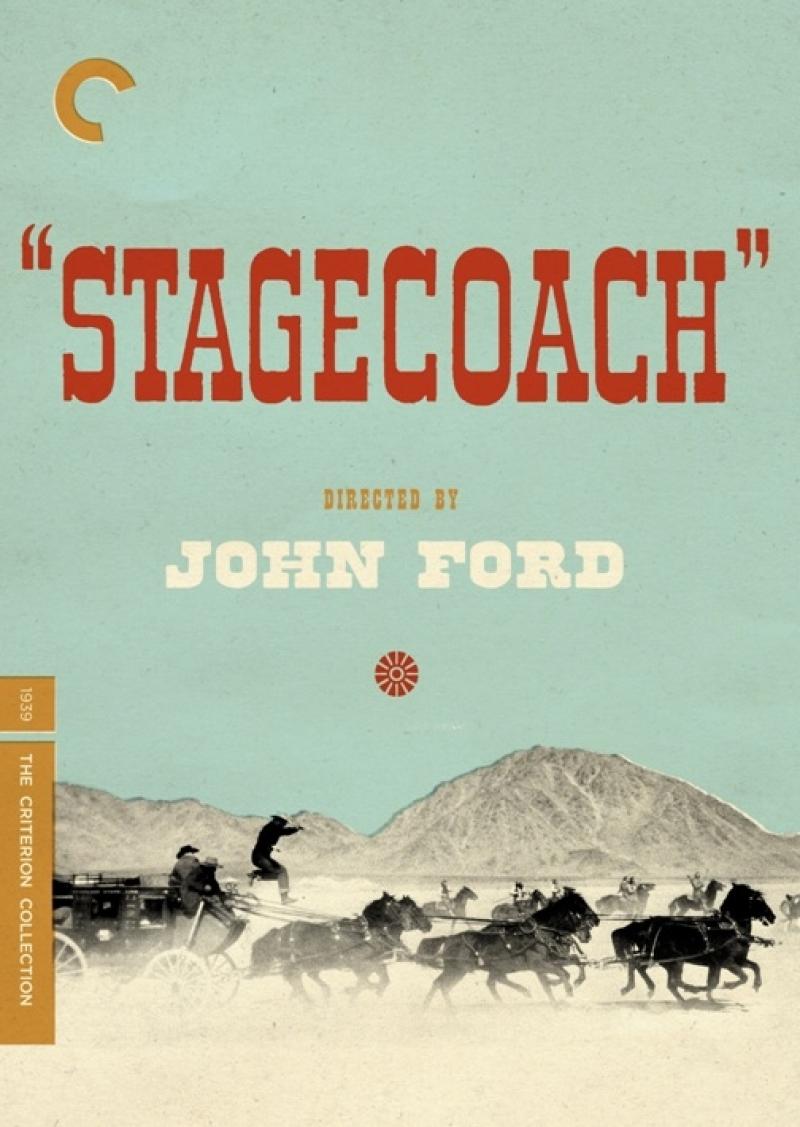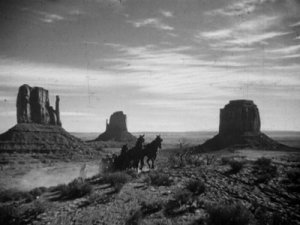DVD Release: Stagecoach | reviews, news & interviews
DVD Release: Stagecoach
DVD Release: Stagecoach
John Wayne classic re-released again, with even more extras
Tuesday, 15 June 2010

'Stagecoach': The epochal western that made a star of John Wayne
For the second time in four years, John Ford’s Stagecoach - the epochal black-and-white 1939 B-western that made a star of John Wayne and an icon of Monument Valley, and anticipated Ford’s unequalled run of westerns over the next quarter-century and the psychological westerns of the Fifties - has been remastered and reissued in a substantial two-disc DVD package.
The eyes of Ford and Wayne completists should thus light up like those of the alcoholic Doc Boone (Oscar-winner Thomas Mitchell) relishing a couple of days’ proximity with the milquetoast whisky drummer Samuel Peacock (Donald Meek) on their journey from Tonto to Lordsburg in New Mexico in 1884 - Geronimo on the warpath be damned.
When Warner Bros released its Stagecoach DVD in 2006 the extras included the excellent 83-minute documentary John Ford/ John Wayne: The Filmmaker & the Legend; a half-hour piece about the film’s making and content that broke little ground; and a vintage radio adaptation in which Randolph Scott stepped in for Wayne as the escaped convict the Ringo Kid and Claire Trevor reprised her screen role as Dallas, whom Ringo courts not knowing she’s a prostitute ostracised by most of their fellow passengers.
The new release by Criterion is busier. It includes Philip Jenkinson’s rivetingly awkward 1968 BBC interview with Ford, who veers from suspicious and condescending to charming and anecdotal, then back again; Ford’s 1917 modern ranch romance Bucking Broadway, which is no formative classic but pre-echoes the East-West class conflicts of Stagecoach; interview-driven pieces on Ford’s colonisation of Monument Valley and the death-defying work of ace stuntman Yakima Canutt; a selection of Ford home movies taken aboard his yacht; and a radio adaptation starring Wayne, Trevor and Ford regular Ward Bond in place of Mitchell. There’s an atmospheric visual essay written and narrated by Tag Gallagher, who draws on the observations he made in his Ford biography about the spurning of Dallas by the snobbish army wife Lucy Mallory (Louise Platt). And there’s an obligatory interview with Ford acolyte Peter Bogdanovich, which is lacklustre except when he recalls the master’s casual cruelty.
 Among the written materials is Ernest Haycox’s source story “Stage to Lordsburg”, which screenwriter Dudley Nichols added to and deleted from as he and Ford, influenced by Guy de Maupassant’s bitter Franco-Prussian War story Boule de Suif, expertly transformed their trope-ridden oater into a powerful microcosmic vehicle for social commentary. Their target was the timeless bourgeois hypocrisy embodied by Lucy, the aristocratic Virginian gambler (and probable murderer) Hatfield (John Carradine), who protects her out of loyalty to faded Southern gentility, and the thieving Republican banker Gatewood (Berton Churchill), and opposed by the disreputable but moral Westerners Ringo, Dallas, and Doc. One of the joys of watching Stagecoach is observing to what extent these travellers change individually as their collective circumstances worsen due to Lucy being called to childbed, their betrayal by the Apache wife of the Mexican station-keeper at the Apache Wells way station, and the inevitable attack by Geronimo. Delivering the baby redeems Doc. Helping him in it transfigures Dallas. Peacock becomes the spokesman for Christian fellow-feeling. Hatfield gets off his Confederate high horse and rallies to the cause when the Apaches attack. Ringo fights heroically for the group instead of deserting it to escape to Mexico or wage his personal vendetta. Except for Gatewood, they all change for the communal good - even, subtly, the buffoonish driver (Andy Devine) and the authoritative shotgun-riding marshal (George Bancroft).
Among the written materials is Ernest Haycox’s source story “Stage to Lordsburg”, which screenwriter Dudley Nichols added to and deleted from as he and Ford, influenced by Guy de Maupassant’s bitter Franco-Prussian War story Boule de Suif, expertly transformed their trope-ridden oater into a powerful microcosmic vehicle for social commentary. Their target was the timeless bourgeois hypocrisy embodied by Lucy, the aristocratic Virginian gambler (and probable murderer) Hatfield (John Carradine), who protects her out of loyalty to faded Southern gentility, and the thieving Republican banker Gatewood (Berton Churchill), and opposed by the disreputable but moral Westerners Ringo, Dallas, and Doc. One of the joys of watching Stagecoach is observing to what extent these travellers change individually as their collective circumstances worsen due to Lucy being called to childbed, their betrayal by the Apache wife of the Mexican station-keeper at the Apache Wells way station, and the inevitable attack by Geronimo. Delivering the baby redeems Doc. Helping him in it transfigures Dallas. Peacock becomes the spokesman for Christian fellow-feeling. Hatfield gets off his Confederate high horse and rallies to the cause when the Apaches attack. Ringo fights heroically for the group instead of deserting it to escape to Mexico or wage his personal vendetta. Except for Gatewood, they all change for the communal good - even, subtly, the buffoonish driver (Andy Devine) and the authoritative shotgun-riding marshal (George Bancroft).The main reason for purchasing the Criterion edition is the superb transfer from the best existing prints (the original negative having long disappeared). Experienced under optimum conditions Bert Glennon’s black-and-white chiaroscuro cinematography comprises a psychologically resonant expressionistic shadowplay - in the passageway at Apache Wells where Ringo watches Dallas walk away, in the streets of the hellish town of Lordsburg where Ringo, at journey’s end, seeks revenge on his brother and father’s killer. To photograph Citizen Kane, Orson Welles hired Gregg Toland, who shot The Grapes of Wrath and The Long Voyage Home (both 1940) for Ford, but it was Stagecoach that he watched 40 times while preparing Kane, so Glennon’s work must have been hugely influential. Indeed, it can be claimed that Stagecoach exerted more immediate influence on film noir than it did on early Forties westerns.
Beyond the microcosm of nine little people (10 if you include the newborn) is the monolithic cosmic reality of Monument Valley’s giant West and East Mitten and Merrick buttes, which dwarf the stagecoach as it passes by them at, surreally, different points during the story. The “huge emblems of menace”, as Garry Wills has called them, render the Valley “a place to be got through, to be endured. It is a forge of souls, a test of valor, a passageway to the unknown”. Ford literalises this menace when he suddenly pans left from the East Mitten to the Apaches (played by the resident Navajos) on a foregrounded rock shelf. An analogy has also been drawn between that future monolith, “John Wayne”, the natural “good badman", bringing the spirit of the landscape into the coach when he climbs into it. Harmonising the terrain and the 31-year-old actor - finally ready for stardom nine years afterThe Big Trail flopped - was an act of mythographic genius, even if most of it was done through process shots. The DVD just about contains them.
The future of Arts Journalism
You can stop theartsdesk.com closing!
We urgently need financing to survive. Our fundraising drive has thus far raised £49,000 but we need to reach £100,000 or we will be forced to close. Please contribute here: https://gofund.me/c3f6033d
And if you can forward this information to anyone who might assist, we’d be grateful.

Subscribe to theartsdesk.com
Thank you for continuing to read our work on theartsdesk.com. For unlimited access to every article in its entirety, including our archive of more than 15,000 pieces, we're asking for £5 per month or £40 per year. We feel it's a very good deal, and hope you do too.
To take a subscription now simply click here.
And if you're looking for that extra gift for a friend or family member, why not treat them to a theartsdesk.com gift subscription?
more Film
 Bugonia review - Yorgos Lanthimos on aliens, bees and conspiracy theories
Emma Stone and Jesse Plemons excel in a marvellously deranged black comedy
Bugonia review - Yorgos Lanthimos on aliens, bees and conspiracy theories
Emma Stone and Jesse Plemons excel in a marvellously deranged black comedy
 theartsdesk Q&A: director Kelly Reichardt on 'The Mastermind' and reliving the 1970s
The independent filmmaker discusses her intimate heist movie
theartsdesk Q&A: director Kelly Reichardt on 'The Mastermind' and reliving the 1970s
The independent filmmaker discusses her intimate heist movie
 Blu-ray: Wendy and Lucy
Down-and-out in rural Oregon: Kelly Reichardt's third feature packs a huge punch
Blu-ray: Wendy and Lucy
Down-and-out in rural Oregon: Kelly Reichardt's third feature packs a huge punch
 The Mastermind review - another slim but nourishing slice of Americana from Kelly Reichardt
Josh O'Connor is perfect casting as a cocky middle-class American adrift in the 1970s
The Mastermind review - another slim but nourishing slice of Americana from Kelly Reichardt
Josh O'Connor is perfect casting as a cocky middle-class American adrift in the 1970s
 Springsteen: Deliver Me From Nowhere review - the story of the Boss who isn't boss of his own head
A brooding trip on the Bruce Springsteen highway of hard knocks
Springsteen: Deliver Me From Nowhere review - the story of the Boss who isn't boss of his own head
A brooding trip on the Bruce Springsteen highway of hard knocks
 The Perfect Neighbor, Netflix review - Florida found-footage documentary is a harrowing watch
Sundance winner chronicles a death that should have been prevented
The Perfect Neighbor, Netflix review - Florida found-footage documentary is a harrowing watch
Sundance winner chronicles a death that should have been prevented
 Blu-ray: Le Quai des Brumes
Love twinkles in the gloom of Marcel Carné’s fogbound French poetic realist classic
Blu-ray: Le Quai des Brumes
Love twinkles in the gloom of Marcel Carné’s fogbound French poetic realist classic
 Frankenstein review - the Prometheus of the charnel house
Guillermo del Toro is fitfully inspired, but often lost in long-held ambitions
Frankenstein review - the Prometheus of the charnel house
Guillermo del Toro is fitfully inspired, but often lost in long-held ambitions
 London Film Festival 2025 - a Korean masterclass in black comedy and a Camus classic effectively realised
New films from Park Chan-wook, Gianfranco Rosi, François Ozon, Ildikó Enyedi and more
London Film Festival 2025 - a Korean masterclass in black comedy and a Camus classic effectively realised
New films from Park Chan-wook, Gianfranco Rosi, François Ozon, Ildikó Enyedi and more
 After the Hunt review - muddled #MeToo provocation
Julia Roberts excels despite misfiring drama
After the Hunt review - muddled #MeToo provocation
Julia Roberts excels despite misfiring drama
 Ballad of a Small Player review - Colin Farrell's all in as a gambler down on his luck
Conclave director Edward Berger swaps the Vatican for Asia's sin city
Ballad of a Small Player review - Colin Farrell's all in as a gambler down on his luck
Conclave director Edward Berger swaps the Vatican for Asia's sin city
 London Film Festival 2025 - Bradley Cooper channels John Bishop, the Boss goes to Nebraska, and a French pandemic
... not to mention Kristen Stewart's directing debut and a punchy prison drama
London Film Festival 2025 - Bradley Cooper channels John Bishop, the Boss goes to Nebraska, and a French pandemic
... not to mention Kristen Stewart's directing debut and a punchy prison drama

Add comment